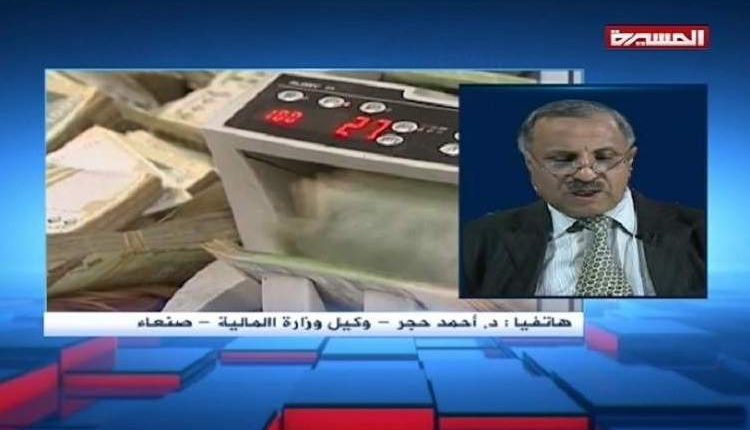Sana’a: pro-Saudi Government Agreement with AMF is Illegal
“The pro-Saudi Government agreement with the Arab Monetary Fund cannot be accepted because it is illegal, and aim of the last loan is to flood Yemen with loans targeting the Yemeni economy,” the Undersecretary of Ministry of Finance, Ahmed Hajar said.
He stated that the projects that will be financed from the Arab Monetary Fund loan are not known, and it will serve the US-Saudi aggression, not the Yemeni society. He pointed out that all economic policies pursued by the countries of aggression in Yemen violate the laws.
The Undersecretary of the Ministry of Finance went on to say that borrowing from the Arab Monetary Fund is going to the largest lone yet, and the interest rate in it is many times the loans from international institutions.
Recently, The Central Bank issued an important statement regarding the approval of the International Monetary Fund to support the account of the Central Bank branch in Aden with an amount of $300 million from the special drawing rights of Yemen.
The statement stressed that the decision of the International Monetary Fund reveals the contradiction of its policies and decisions and the duplication of its dealings with the same issues according to political agendas, pointing out that the US-Saudi aggression seek to implement their plans towards Yemen, by providing funds illegally to finance military operations and the war on Yemen.
The statement indicated that the Central Bank in Sana’a had previously informed the International Monetary Fund of its objection to any decision to approve enabling the branch of the Central Bank in Aden to use the special drawing rights of Yemen.
The statement also indicated that the Central Bank demanded the provision of management of the rights of withdrawal units through a third party to ensure that the value of these units is used to finance commodity imports, and the allocation of the equivalent in Yemeni riyals to pay the salaries of state employees.
For its part, the Central Bank also demanded that the value of the drawing rights units be used to pay part of the value of the local public debt owed to banks operating in Yemen, explaining that paying part of the public debt owed to banks enables them to pay part of the funds of their depositors, and alleviates the banks’ obligations and the liquidity crisis they are going through.
The statement added, “We demanded to stop any disposal of the Special Drawing Units of the Republic of Yemen, until the end of the aggression against Yemen, in order to ensure that the entire Yemeni people benefit from the drawing rights units.”
The statement warned that: “In the event that the International Monetary Fund rejects any of our demands, we reaffirm our total rejection of any decision taken by the Fund regarding the Special Drawing Rights of the Republic of Yemen.”
The statement stressed: “We release our responsibility from any burdens that will result from the decision of the International Monetary Fund in the event that it rejects our demands.”
The Central Bank statement affirmed that it reserves the legal right to hold accountable and prosecute any entity or party that works, facilitates, or contributes directly or indirectly to the exploitation, waste and appropriation of the rights of the Yemeni people.
Saudi Arabia and the UAE, backed by the United States and regional allies, launched the war on Yemen in March 2015, with the goal of bringing the government of former Yemeni president Abd Rabbuh Mansour Hadi back to power.
The war has left hundreds of thousands of Yemenis dead and displaced millions more. It has also destroyed Yemen’s infrastructure and spread famine and infectious diseases there.
As part of its economic war, the US-Saudi aggression worked to drain about 97% of the Yemeni state’s resources, either by controlling them militarily such as oil and gas sources, freezing Yemeni foreign assets and transferring them to mercenaries and financing coalition operations, or imposing siege on the vital port of Hodeidah and the most important port after Aden, which is still in the grip of Sana’a and out of control of the aggression.

